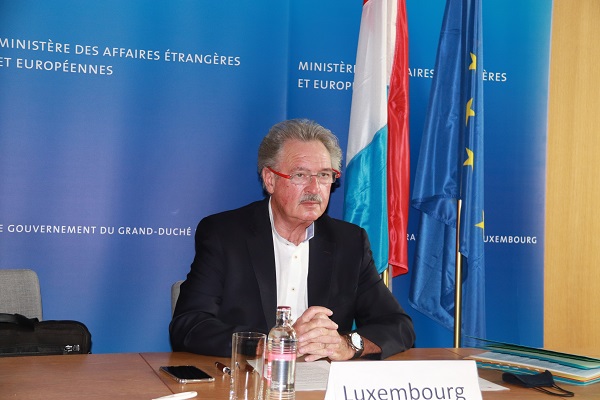 Jean Asselborn, Luxembourg's Minister of Foreign and European Affairs;
Credit: MAEE
Jean Asselborn, Luxembourg's Minister of Foreign and European Affairs;
Credit: MAEE
On Tuesday 23 February 2021, Luxembourg's Minister of Foreign and European Affairs, Jean Asselborn, participated in the European Council's informal video conference meeting of European affairs ministers.
The virtual meeting was an opportunity to prepare the video conference meeting of the members of the European Council on 25 and 26 February 2021. The ministers responsible for European affairs notably took stock of the current situation of the COVID-19 pandemic and the coordination of national measures in this context.
Minister Jean Asselborn recalled that all measures taken, and in particular those relating to restrictions on freedom of movement, must comply with European law. He stressed: “However legitimate the protection of public health may be, European law imposes limits on us, particularly in terms of proportionality”. Luxembourg's Foreign Minister drew the attention of his counterparts to the particular situation of cross-border communities which constitute around 30% of European Union (EU) citizens. He pointed out: "These communities are currently disproportionately targeted compared to other populations and they suffer in particular from national measures hampering free movement at internal borders".
Minister Jean Asselborn also recalled the recommendation adopted by the Council on 1 February 2021 on a coordinated approach to restricting free movement in response to the COVID-19 pandemic, and more particularly the exemptions provided for therein for people living in border regions and especially those exercising critical functions. He invited the European Commission to examine the measures put in place since March 2020 and "their compatibility with the fundamental right of Europeans which is free movement and the principles of the internal market".
Luxembourg's Foreign Minister continued: “At the same time, to avoid new crises in the future, we must now create a real Europe of strong and united health", adding that “Luxembourg supports the strengthening of the mandate of the ECDC [European Centre for Disease Prevention and Control]. The work of this European agency has shown how necessary it is for the Union's actions to be based on evidence. As a top priority, we call on the ECDC to develop guidance on standardising sequencing procedures as soon as possible to ensure data comparability”.
As regards proof of vaccination, Minister Jean Asselborn noted that "a use which would go beyond certificates for medical purposes, essential to the pharmacovigilance process, is for the moment premature".
Subsequently, the Portuguese Presidency briefed the ministers on the latest exchanges with the other European institutions concerning the Conference on the Future of Europe. The video conference also enabled ministers to discuss the European Democracy Action Plan, which provides for protecting electoral processes, promoting democratic participation, strengthening media pluralism and combating disinformation. Finally, the ministers took stock of relations between the EU and the United Kingdom.








